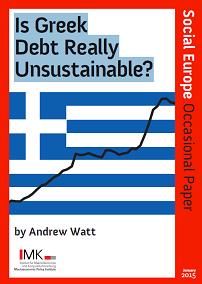Darvas, Z. & Hüttl, P. (2015) “Why a Grexit is more costly for Germany than a default inside the euro area – Contrary to the IFO institute, we conclude that German losses on both official and private claims would be much higher if Greece exits the euro“, Bruegel Institute, 16 Ιανουαρίου. A few days ago the influential IFO Institute published a short paper suggesting that a Greek default inside …Read More
Zoning out – Why leaving the euro would still be bad for both Greece and the currency area
Zoning out – Why leaving the euro would still be bad for both Greece and the currency area, The Economist, 17 Ιανουαρίου 2015. In 2012 Greece held two elections which might have led to its exit from the euro zone. In the event, that was avoided—a good thing since the costs of a “Grexit” would almost certainly have outweighed any gains, not only for Greece but for the entire …Read More
How to reduce the Greek debt burden?
Darvas, Z. & Hüttl, P. (2015) “How to reduce the Greek debt burden? – There are options to reduce the net present value of Greek public debt servicing costs by more than 15 percent of GDP without incurring losses on creditors, Bruegel Institute Analyses, 09 Ιανουαρίου. The Greek debt reduction issue has been put back on the table as the 25 January 2015 parliamentary snap elections are approaching. Already in …Read More
Is Greek Public Debt Unsustainable? It’s The (nominal growth rate of the) Economy, Stupid!
Watt, A. (2015) “Is Greek Public Debt Unsustainable? It’s The (nominal growth rate of the) Economy, Stupid!“, Social Europe Journal, Occasional Papers No. 6, Ιανουάριος. Greece will go to the polls on January 25th and everybody from German conservatives to Greek leftists seems to agree: Greek public debt is unsustainable. A haircut on investors and some form of partial default – more politely known as debt restructuring – is …Read More
Το Grexit έχει λιγότερους κινδύνους για την Ευρωζώνη
Εικονογράφηση: Τιτίνα Χαλματζή, Πηγή: Καθημερινή. Χαλιάσος, Μιχάλης (2015) “Το Grexit έχει λιγότερους κινδύνους για την Ευρωζώνη“, Εφημερίδα Καθημερινή, 11 Ιανουαρίου. «Εχουμε πάρει απλώς παυσίπονα για να αντιμετωπίσουμε τα συμπτώματα. Δεν έχουμε φτάσει στην αιτία του προβλήματος». Ετσι εξηγεί ο Μιχάλης Χαλιάσος, καθηγητής Οικονομικών στο Πανεπιστήμιο Goethe της Φρανκφούρτης, την αρνητική του απάντηση στο ερώτημα της «Κ» αν τα πλεονάσματα που έχει πετύχει η Ελλάδα, μετά έξι χρόνια ύφεσης και …Read More
Debt relief for Greece is necessary to avoid a crisis in the Eurozone
De Grauwe, Ρ. (2015) “Debt relief for Greece is necessary to avoid a crisis in the Eurozone“, LSE EUROPP, 12 Ιανουαρίου. On 25 January Greece will hold parliamentary elections. The elections have generated uncertainty in the Eurozone given the potential for the radical left party Syriza, which has called for a renegotiation of the country’s bailout conditions, to emerge as the largest party. Paul De Grauwe writes that even …Read More
The impact of fiscal austerity on suicide: On the empirics of a modern Greek tragedy
Antonakakis, N. & Collins, A. (2015) “The impact of fiscal austerity on suicide: On the empirics of a modern Greek tragedy“, Social Science and Medicine Journal, Volume 112, Ιούλιος 2014, σσ. 39-50. Highlights We examine the effects of fiscal austerity on suicide in Greece over the period 1968–2011. The effects of fiscal austerity and economic growth are gender- and age-specific. Fiscal austerity affects only the male population, …Read More
The Greek Election 2015 – Revolt Of The Debtors
De Grauwe, P. (2015) “The Greek Election 2015 – Revolt Of The Debtors“, Social Europe Journal, 05 Ιανουαρίου. The Greek debt crisis that erupted in 2010 is back and again threatens the stability of the Eurozone. That crisis was the result of two factors. First, an unbridled spending drift of both the private and the public sectors in Greece during the boom years of 2000-2010, which led to unsustainable …Read More
Uncertain Silver Linings
Mendelsohn, J. (2015) “Uncertain Silver Linings, The European Magazine, Why Greece Should Not Leave the Euro Column, 07 Ιανουαρίου. Unlike other European politicians, Alexis Tspiras may not be making empty promises. He may actually present a chance for real change. Radical change. In light of the Greek elections and a possible Syrizian win, Europe, and Europe’s North in particular, has a lot to fear. Let’s not kid ourselves, Tspiras …Read More
Why Grexit would not help Greece – debunking the myth of exports
Wolff, Β. G. (2015) “Why Grexit would not help Greece – debunking the myth of exports“, Bruegel Institute, 06 Ιανουαρίου. The genie is out of the bottle: Europe is again discussing the possibility of Greece leaving the euro. With it, the debate has re-emerged whether this would be helpful or not for Greece and whether there would be contagion to other euro area countries. A big question is, of …Read More










